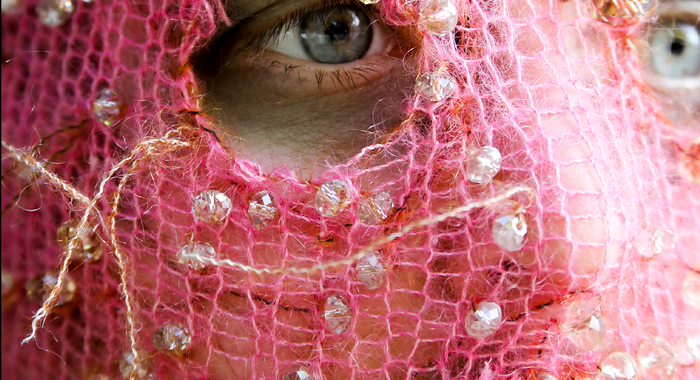Ingrid Kraftchenko’s Pre-SS19: a performative ode to the body in charge
Enacted as an immersive performance, this collection aims at breaking down some of the stereotypes that still lurk behind the fractured facade of our liberal society.
The rhetoric of the objectified female body is one that humanity has been diligently dragging throughout history as a heavy weight that simply won’t budge. Be it the body of the penitent Magdalene or that of Lot’s daughters whose bodies he offered to be raped by the Sodomites instead of those of the angels. Women’s bodies have been fated and condemned for their nature, but, most importantly, the objectified body of the woman had always been denied the power of agency, the very power of rejecting the binary code of subject and object and become, BE.
Prostitutes, sinners, adulteresses - the body of the woman stripped down by the essentialist nature of patriarchy, the madonna-whore complex of lascivious desires and puritan wants. What is to be made of this carnefice which has moulded the body of the woman into a spectacle for the male gaze or a mannequin for our commercial desires? Is a woman really ever in charge of her body or is it still scrutinized and performed under the watchful eye of misogynist society? When you walk past Amsterdam’s red light district do you look down on these bodies or up to these women? Ingrid Kraftchenko’s Pre-SS19 collection REJECT, enacted as an immersive performance, aims at breaking down these calcified stereotypes that still lurk behind the fractured facade of our liberal society.
145 Bethnal Green Road: Kraftchenko’s REJECT is unleashed upon the gatherers in all its emblazoned glory: pvc transparencies, asymmetrical belted suits and her indisputable red aprons to unveil a collection that both refuses and embodies our socio-political climate. It is a collection that aims to go against the grain and be resistant to consumerist society to create a new form of aestheticism based on the reappropriation and renewal of discarded clothing or objects.
Here, behind the glass windows of a shop, stand the wrapped bodies of three women. A crowd gathers. The women begin to unwrap their prized bodies, an allude and, at the same time, a middle finger to the objectification and customary nature of the commercial fashion industry where bodies become mannequins and mannequins desires. I picture the dynamic of the woman’s body served as a gift to the hoards of lurking spectators waiting to bite into the flesh of unadulterated desire, in a scene reminiscent of Aronofsky’s ‘Mother!’ but what I get is the opposite, the negation of it - a rejection.
The three women, each modelling the pieces from Kraftchenko’s pre-SS19 collection transcend the role of the model, the ‘Deuxieme Sexe’, and that of the nurturing provider. In this durational performance piece, they nonchalantly take their clothes off and hang them on butcher hooks, loiter outside their ‘glass menagerie’ smoking cigarettes and, like black widow spiders, snatch unsuspecting spectators and drag them inside. Each woman embodies their own personality and performs it through the different garments, infusing each piece with doses of eroticism, innocence and dominance. They are in control of their bodies, and love to show that. The non-gendered garments in Kraftchenko’s REJECT collection embody this attitude: the body is a performative sleeve each of us are born into with exactly the same rights and agency upon, it is up to the individual to dress it or undress it as they please without having to be constrained by their sexuality, attitude or beliefs.
Kraftchenko shows women in control: in control of their bodies, their wants and desires. A power that can be displayed by allowing the body to be dominant as well as submissive. A body in turmoil as well as a body in peace. Here, the role of the fashion designer, performer and artist blur and implode into one: the designer becomes the practitioner of their own bodily performativity, the artist of their own desires and the master of their own identity. Kraftchenko’s REJECT collection is for the body as agency.

